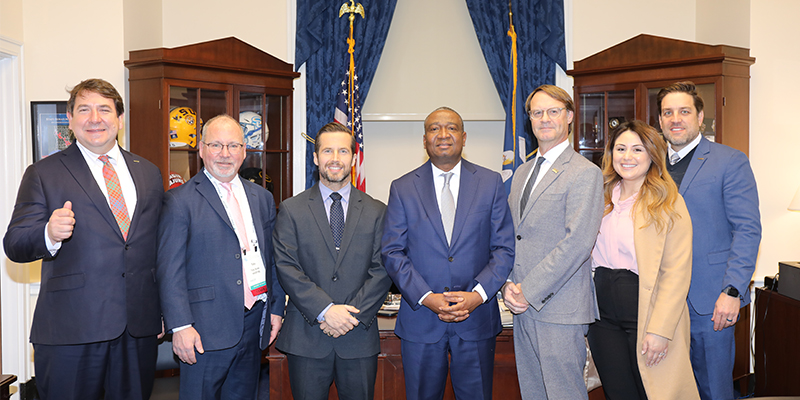By Eric Schmutz
Last week, Congressional Republicans made significant progress in their efforts to advance President Donald Trump’s tax and spending priorities, with House Republicans agreeing to a 70-page budget blueprint that lays out a fiscal framework for implementing the president’s border security, defense, energy and tax priorities. Senate Republicans approved the measure by a vote of 51-48 on April 5 after an all-night session. The budget resolution sets the framework for subsequent reconciliation legislation that Senate Republicans need to bypass that body’s 60-vote filibuster threshold.
The House began consideration of the resolution on April 9, but Speaker Mike Johnson (R-LA) was forced to delay the measure until a group of holdouts could be convinced by the White House and Senate Majority Leader John Thune (R-SD) that they were all committed to greater spending reductions than were included in the text of the resolution. The resolution narrowly passed on April 10 by a vote of 216-214.
The resolution is essentially a fiscal blueprint of tax and spending targets that will allow congressional lawmakers to extend Trump’s expiring tax provision and bundle it with many of the president’s new priorities into a single bill that can pass the Senate without Democratic support. In addition to tax legislation, Republican lawmakers expect the bill to increase the debt limit, cut spending, and boost border security and national defense.
The one-bill strategy is intended to make it more difficult for Republicans to defy the president on an up-or-down vote on his agenda. The bill will give the different factions victories to highlight, while forcing them to accept the provisions that they opposed.
The focus now turns to the mark-up process, expected to begin the week of May 6, where congressional committees in both chambers will draft legislation that fits within the parameters of the resolution. Expect to see a flurry of activity over the next several months as congressional Republicans work to overcome differences in priorities on taxes, Medicaid funding and budget deficits. The unity displayed thus far has been possible because Johnson has been able to delay the inevitable debate over the most contentious issues.
Now the House and the Senate will have to come to an agreement on tax provisions and spending reductions, while working through the challenges of the differences in the budget resolutions. This is made more challenging because the original House proposal calls for $1.5 trillion in spending cuts and $4 trillion in tax cuts over its 10-year budget, while the Senate plan requires a floor of $4 billion in spending cuts and allows for up to $5 trillion in tax reduction.
The resolution also calls for an additional $150 billion in defense spending and $175 billion for additional border security and immigration enforcement.
While Johnson has suggested that he would like to see the reconciliation legislation on the president’s desk before Memorial Day, the debt limit is likely to influence the timeline.
NAIOP’s government affairs team has been meeting lawmakers in both chambers to emphasize the importance of maintaining tax policy that is beneficial for commercial real estate and economic growth.
As part of these efforts, we have joined allied real estate associations in urging lawmakers to reject a proposal to limit the deductibility of state and local property taxes on businesses. This proposal could have a devastating impact on property values, rents, the health of the financial system, local communities, and consumer prices.
We are also working to protect the current capital gains rate, the current tax treatment of carried interest, and 1031 like-kind exchanges, along with encouraging lawmakers to support renewal of opportunity zones and the section 199A deduction for pass-through businesses. Like all businesses, commercial real estate can only prosper with a fair and stable tax code. NAIOP’s government affairs team will continue to underscore this critical message with lawmakers on Capitol Hill.








